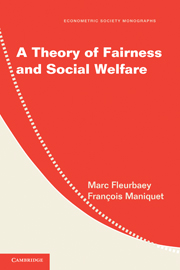9 - Private Goods
Published online by Cambridge University Press: 05 January 2013
Summary
INTRODUCTION
In this chapter, we continue our analysis of production economies, under the assumption that the produced good is a private good. In the first sections of the chapter, we stick to the assumption that agents own some endowments of the input privately. The most natural interpretation is that the inputs are agents' labor contributions and the output is their income. The resulting model is not much different from the model of the previous chapter. Consequently, we could replicate the axiomatic study we carried out in Chapter 8, but in this chapter we put the emphasis on other issues.
As the model under study is a pure private good model, we can expect to see the (equal income) Walrasian allocations play a role again. We do see them back in the picture, but we focus here on a different justification. In Chapter 5, we showed how a Walrasian social ordering function could be derived axiomatically. The existence of a production technology does not prevent us at all from deriving a similar social ordering function in the current model. The adaptation of the axiomatic analysis of Chapter 5 will not be examined here, however, as it is rather straightforward.
We propose, instead, a derivation of the Walrasian allocations from an implementation point of view. That is, our focus is on a specific social ordering function, the P-equivalent leximin social ordering function (P denotes the production set), that is reminiscent in the current model of the Ω-equivalent leximin social ordering function of Part II and the C-equivalent leximin social ordering function of the previous chapter.
- Type
- Chapter
- Information
- A Theory of Fairness and Social Welfare , pp. 166 - 179Publisher: Cambridge University PressPrint publication year: 2011

